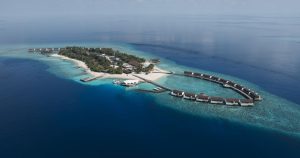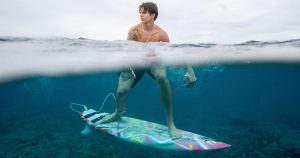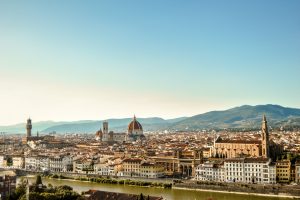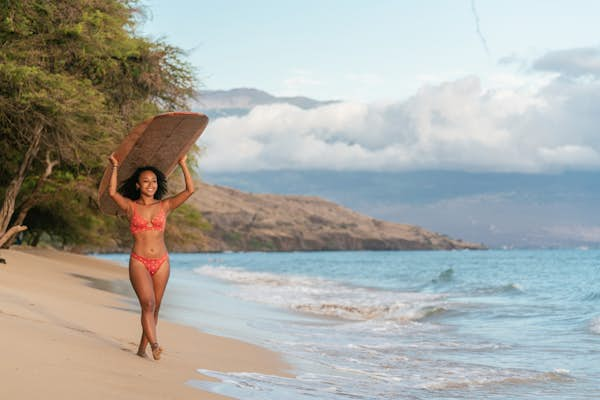
There’s one thing every visitor to Hawaii wants to do — hit the beach.
And it makes sense since Hawaii’s beaches are among the best in the world. From powdery-white sands to otherworldly volcanic landscapes, from secluded coves to world-class surf breaks, the Islands boast a variety of beachy escapes perfect for every traveler. All are open to the public below the high-tide line; there are no private beaches in Hawaii.
Here are our picks of the state’s best beaches, ordered by island.
Immerse yourself in the best experiences the world has to offer with our email newsletter delivered weekly into your inbox.
1. Kailua Beach, Oʻahu
On Oʻahu’s windswept windward side, Kailua Beach is a beach lover’s paradise, with soft sands that stretch 2.5 miles long with the majestic Koʻolau Mountains as the backdrop. Its aquamarine waters are a fabulous playground — you’ll see people surfing, paddling canoes, swimming, kiteboarding, bodysurfing and kayaking here. And there’s so much space, you can easily find a spot to yourself.
On the east end of the beach, there’s a big parking lot, with restrooms and picnic pavilions. It’s also one of the few beaches on Oʻahu that’s dog friendly, so you’ll likely see four-legged friends running and playing in the sand. From the parking lot, it’s a short walk to nearby Lanikai Beach; this gorgeous beach is smaller and often more crowded than Kailua Beach, as people flock here to catch the sunrise over the twin Mokulua Islands.
Planning tip: The parking lot can fill up quickly, and finding a spot near a beach access point can be difficult. Consider renting a bike from The Bike Shop in Kailua Town. (There’s no city-run bike-sharing on this side of the island.) The shop has a range of cruisers, mountain bikes and road bikes for rent, complete with helmets and bike locks. Electra cruises — the most popular bike — start at $18 for up to four hours. You can book online and pick it up at the shop.
 Surfers will want to head for the legendary Waikiki Beach on O‘ahu © emperorcosar / Shutterstock
Surfers will want to head for the legendary Waikiki Beach on O‘ahu © emperorcosar / Shutterstock
2. Waikiki Beach, Oʻahu
Waikiki is the quintessential Hawaiian beach – sparkling waters, golden sand and so much to do at and around it. No wonder Hawaiian aliʻi (royalty) lived and played here! The legendary surfer and Olympian Duke Kahanamoku rode the waves in Waikiki, and you can learn how to surf here from a modern-day beach boy or girl. Ride rolling waves in an outrigger canoe or hop on a catamaran for a sunset sail.
There are several separate named beaches in Waikiki, from the picturesque Kaimana Beach by the 200-acre Kapiʻolani Park to the glistening sands of Duke Kahanamoku Beach, which boasts a kid-friendly lagoon in front of the Hilton Hawaiian Village Waikiki Beach Resort. Sip a mai tai at a beachside bar or take in afternoon tea at the historic Moana Surfrider. Everything — hotels, restaurants, boutiques, convenience stores, coffee shops, a zoo and aquarium — is within walking distance.
Planning tip: If you’re on Oʻahu on a Friday, the Hilton Hawaiian Village Waikiki Beach Resort puts on a fireworks show every Friday night. The resort has been doing this since 1988 (with a two-year break during the pandemic). Bring a picnic dinner and find a spot on the beach to watch the skies light up. The show starts at 7:45pm during the winter and 8pm in the summer.
3. Hanauma Bay, Oʻahu
One of the best places to snorkel on Oʻahu is Hanauma Bay, a protected nature preserve formed within an old volcanic crater on the southeast coast of the island. It’s practically an open-air aquarium, bustling with marine life. About 400 species of fish inhabit this bay — butterflyfish, tangs, surgeonfish, parrotfish, Moorish idols, wrasse — as do Hawaiian green sea turtles and the occasional monk seal. Because of a post-pandemic limit on the number of people who can visit the bay, the beach is often gloriously uncrowded. (Pre-Covid visitors averaged 3000 a day; now, only 720 a day are allowed.)
You can rent snorkel gear at the beach concession or bring your own. There are lifeguards, restrooms and a free tram that takes you from the parking lot to the beach. Online reservations are required, and it costs $25 per person for non-Hawaii residents aged 13 years and older. Parking is another $3 per car. The bay is closed on Mondays and Tuesdays.
Detour: Hanauma Bay is located near the residential town of Hawaiʻi Kai, where you can pick up snorkel gear and other beach supplies. A favorite stop is Kokonuts Shave Ice & Snacks in the nearby Koko Marina Center, where you can cool down with a rainbow shave ice or açaí bowl. Even President Barack Obama, who’s from Hawaii, has been spotted here.
4. Sunset Beach, Oʻahu
Oʻahu’s fabled North Shore boasts 7 miles of some of the world’s best surf breaks, luring pro surfers to ride and spectators to witness winter’s monster waves. Sunset Beach – or Paumalū, its original Hawaiian name – is one of the largest stretches of sandy beach on this coastline, wide and spacious for all-day lounging. During the winter the ocean turns treacherous, with waves exceeding 30ft tall and conditions not suitable for swimming, but summer brings calm waters great for snorkeling (always check with lifeguards before venturing out, as ocean conditions can change unexpectedly). Sunsets here are pretty epic, too.
Detour: Less than a mile away is the trailhead to the ʻEhukai Pillbox Hike, a 2-mile roundtrip trek to the top of the northern side of the Koʻolau Mountains overlooking Sunset Beach. The views from the WWII bunkers are breathtaking; you can see nearly the entire North Shore coastline.
5. Kawela Bay, Oʻahu
Locals and guests at the Turtle Bay Resort on Oʻahu’s North Shore have known about this secluded bay for decades. But recently the Trust for Public Land protected 630 acres of this pristine coastal area to ensure it remains undeveloped and open to the public. The five-star resort does offer limited public parking and beach access, though you can also park along Kamehameha Highway about a mile south of the resort and walk through an opening in the fence. The hidden bay is often uncrowded — even empty! — and the waters are calm and great for swimming, snorkeling and kayaking. You may even see a Hawaiian green sea turtle or an endangered monk seal. There are some sandy hiking trails along the beach.
Planning tip: See the bay from horseback. Turtle Bay Resort offers exclusive private and group trail rides along oceanfront trails that anyone can book. The ride is about 45 minutes long.
 You’ll be able to find plenty of space on Big Beach in Makena State Park on Maui © sodapuretravel / Shutterstock
You’ll be able to find plenty of space on Big Beach in Makena State Park on Maui © sodapuretravel / Shutterstock
6. Makena Beach, Maui
Known as Big Beach (or Oneloa in Hawaiian) — and for good reason — Makena Beach on Maui spans two-thirds of a mile long and is 100ft wide in areas. That means there’s plenty of space to lay out on this scenic wildland beach and enjoy the sun and view of the offshore islet Molokini. Shorebreak here can get big, so use caution when venturing into the ocean. The big waves make it a popular spot for bodyboarding and bodysurfing. There’s an entry fee to the state-run Mākena State Park: $5 per person for non-Hawaii residents.
Detour: To the north of the beach, follow a trail over a rocky outcrop to Puʻu Ōlaʻi, or Little Beach. It’s far less crowded and popular among nudists.
7. Kāʻanapali Beach, Maui
Kāʻanapali Beach sprawls for 3 miles on Maui’s sunny western coastline — and it’s action-packed. Its turquoise ocean invites swimmers, surfers and snorkelers to frolic in its crystal-clear waters. In the winter months, you can watch migrating North Pacific humpback whales offshore. There’s a path that meanders along the beach, connecting resorts, restaurants and shops. Enjoy a cocktail at a beachside restaurant or watch the torch-lit cliff diving ceremony at Puʻu Kekaʻa, or Black Rock, which honors King Kahekili, the last chief of Maui. (Don’t jump off the rock yourself!)
Planning tip: The beloved Kāʻanapali Beach Resort recently got an update and, with it, a new oceanfront restaurant called Huihui. The menu weaves traditional ingredients with contemporary flavors — with an unrivaled view, especially at sunset. There’s also live music at night.
8. Hamoa Beach, Maui
Time stands still in Hana, a charming rural community in East Maui that sits at the end of the winding 52-mile Hana Highway. The daunting drive — it can take hours — means the beaches here are often secluded. Hamoa Beach is one of those idyllic spots, small but inviting and backed by a thick grove of hala (pandanus) trees. It offers a much-needed respite after that long drive.
Planning tip: Pause at the roadside stands dotted along the Road to Hana — which is what Hana Highway is known — to pick up small loaves of homemade banana bread, often made using the apple bananas that grow in this wet area.
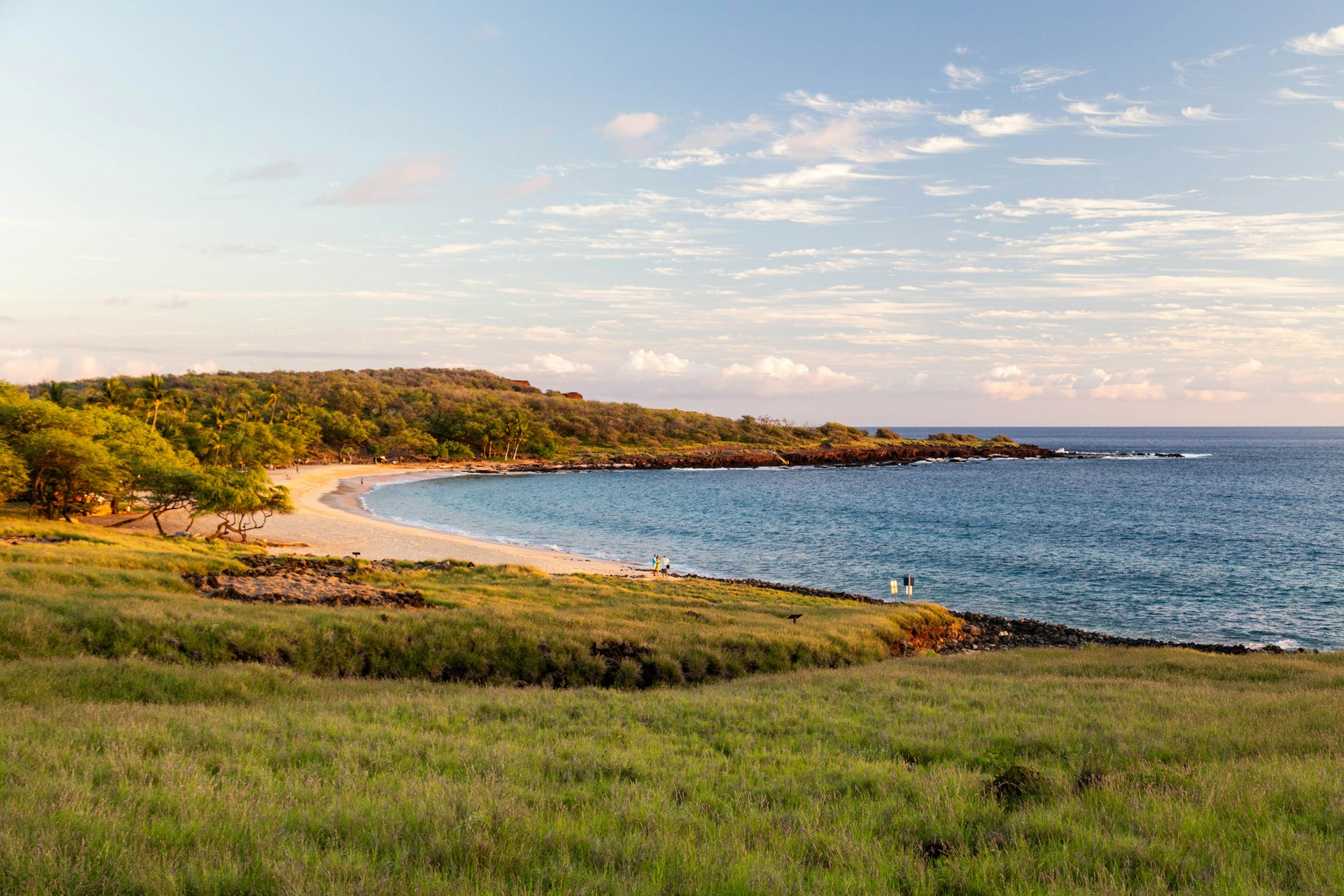 Hulopoʻe Beach is one of Lanaʻi’s best spots for snorkeling © Alexander Howard / Lonely Planet
Hulopoʻe Beach is one of Lanaʻi’s best spots for snorkeling © Alexander Howard / Lonely Planet
9. Hulopoʻe Beach, Lanaʻi
Fronting the luxe Four Seasons Resort Lanaʻi is Hulopo’e Beach, a pristine bay teeming with marine life and one of the best spots on the island for snorkeling. Despite its close proximity to the hotel, this beach feels secluded and undisturbed. Lounge on the white sands and have lunch on one of the picnic tables nearby, or use one of the barbecue grills. Kids will love the large tide pools located on the eastern side of the bay; they’re well-protected and calm enough for exploring. Sometimes you can see spinner dolphins playing in the bay.
Detour: Walk the short trail to Puʻu Pehe, aka Sweetheart Rock. Legend tells the story of a brokenhearted warrior who jumped from this 80ft summit, overcome with grief after his wife’s death. Sunsets here are very romantic.
10. Papohaku Beach, Molokaʻi
One of the longest white-sand beaches in Hawaii is found on Molokaʻi. Papohaku Beach on the island’s western end runs an uninterrupted 3 miles long. And since Molokaʻi receives the fewest visitors of any of other islands, you’ll likely have this beach — or at least parts of it — all to yourself. In the winter months, the ocean here can be treacherous for swimming, but the beach is perfect for long walks or languid picnics. On a clear day you can see Oʻahu across the Kaiwi Channel.
Local tip: There are no traffic signal lights on Molokaʻi, and only about 7000 people live on the island. And in addition to boasting one of the longest strands of beach in the state, Molokaʻi can also claim the tallest sea cliffs in the world, ranging between 3600 and 3900ft above sea level.
11. Poʻipu Beach, Kauaʻi
Poʻipu Beach is all about fun in the sun. This golden, crescent-shaped beach on Kauaʻi’s south shore is great for surfing, snorkeling, swimming and just splashing around. It’s close to resorts and restaurants, too. Kids will love the shallow tide pools and nearby grassy area with a fun play structure. You might see a Hawaiian green sea turtle swimming by or an endangered Hawaiian monk seal basking on the sand.
Planning tip: This beach is a great spot for sunsets. Enjoy a cocktail — try the Monkeypod Mai Tai with local rum and housemade macadamia nut orgeat or the No Kai Oi with local vodka and a honey-lilikoʻi purée — at the oceanfront The Beach House and delight in the spectacular view.
 The beach at Hanalei Bay stretches for 2 miles © Steve Heap / Shutterstock
The beach at Hanalei Bay stretches for 2 miles © Steve Heap / Shutterstock
12. Hanalei Bay, Kauaʻi
Hanalei Bay is the stuff of Hawaiian vacation dreams. This expansive bay is backed by 4000ft emerald mountains — sometimes dotted with waterfalls — and stretches for 2 miles along Kaua’i north shore. During the winter months, big waves roll into this picturesque bay; summer brings more tranquil waters suitable for swimming. The white-sand beach opens up like arms reaching for a hug. No matter where you are on this beach you’ll have incredible views of ocean, mountains and lush valleys. No wonder it’s been the backdrop of Hollywood films like South Pacific (1958) and The Descendants (2011).
Nearby Hanalei Pier was built in 1892 and a popular spot for fishing, swimming and jumping. The wooden pier was lengthened in 1912 to 340ft and, in 1921, improved with a concrete deck. It was added to the National Register of Historic Places in Hawaii in 1979.
13. ʻAnini Beach, Kauaʻi
Tucked away in a residential neighborhood on the north shore of Kauaʻi, ʻAnini Beach is a great alternative to the busier beaches on the south shore. The beach is protected by a long fringing reef that prevents large waves, even in the winter, from reaching shore, making this a great choice for families. Since it’s off the main highway, it doesn’t get as many visitors as other, more accessible beaches. You can camp here, too.
14. Hapuna Beach, Hawaiʻi the Big Island
One of the Big Island’s most expansive — and popular —beaches is Hapuna Beach along the island’s Kohala Coast. Its aquamarine waters and white sand is a stark contrast to the lava landscapes and jagged shorelines unique to this island. The beach is good for swimming, bodyboarding and sunbathing, and there’s enough room to find a quiet spot to lounge or read a book. The Hapuna Beach State Recreation Area has an entry fee of $5 per person and a $10 parking fee for non-Hawaii residents.
Planning tip: There are a handful of farmers markets in the nearby neighborhoods. On Wednesdays the Waimea Midweek Farmers Market boasts dozens of vendors selling hot food, fresh vegetables, jams, honey, coffee and other great local products. On Saturdays, the Kamuela Farmers Market features local produce and flowers, soaps, baked goods and hand-crafted jewelry. There’s live music, too.
15. Papakōlea Beach, Hawaiʻi the Big Island
One of the most unique beaches in Hawaii is Papakōlea Beach, one of only four green sand beaches in the world and the only one in the US. The beach is located in a bay circled by Puʻu Mahana, a tuff ring that partially collapsed. The green sand is actually olivine, a silicate material and a common component of lava. While you can find olivine everywhere in the Islands — Lēʻahi (or Diamond Head) and Hanauma Bay, both on Oʻahu, are examples — nowhere else does it create a beach. It’s a two-hour drive from Kailua-Kona to the parking area, then a 2.5-mile trek to the actual beach. Don’t leave valuables in your car.
Planning tip: There are unofficial shuttles to the beach — some charge $20 per person — and you may feel pressured to take one. It’s up to you. It’s free to walk to the beach.
16. Punaluʻu Beach, Hawaiʻi the Big Island
There’s nothing more striking than Hawaii‘s black-sand beaches, formed by the volcanic activity that created the Hawaiian Islands. Punaluʻu Beach, on the southeastern Kaʻū coast of Hawaiʻi Island, is one of the most famous of these beaches. The surrounding coconut trees and bright green naupaka shrubs are striking against the shimmering, jet-black sands. Strong rip currents make this a dangerous place to swim, so enjoy it from your beach mat. Hawaiian green sea turtles and hawksbill turtles like to bask on the beach here, too.
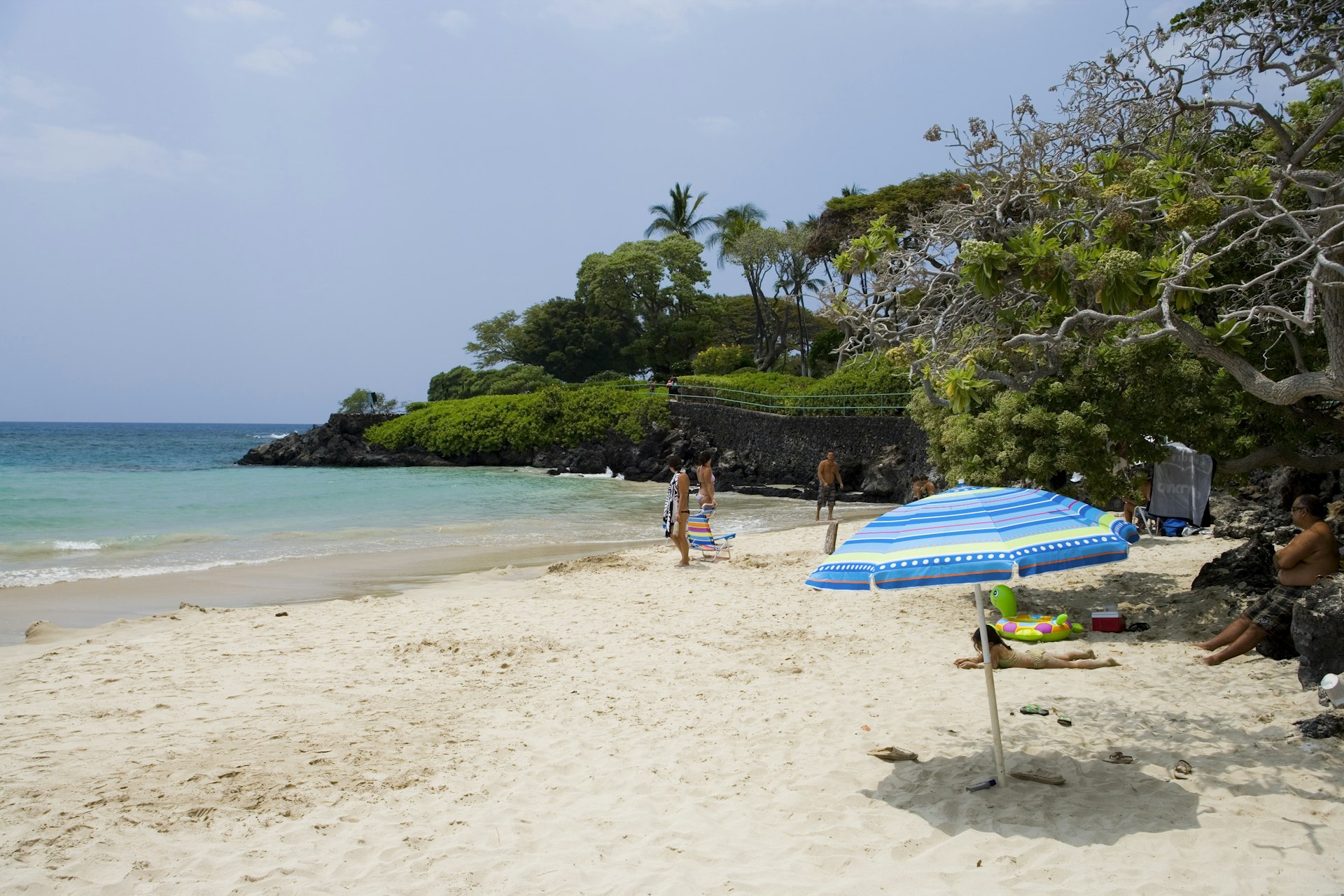 Kauna’oa Bay (Mauna Kea Beach) is a gorgeous place where you may see Hawaiian green sea turtles © Greg Elms / Lonely Planet
Kauna’oa Bay (Mauna Kea Beach) is a gorgeous place where you may see Hawaiian green sea turtles © Greg Elms / Lonely Planet
17. Kaunaʻoa Beach, Hawaiʻi the Big Island
Conservationist and businessman Laurance Rockefeller “discovered” this beach back in 1960 while scouting for locations for a potential hotel. He built the Mauna Kea Beach Resort on this spot — solely because of this gorgeous beach. Now referred to as Mauna Kea Beach, the crescent-shaped Kaunaʻoa Bay boasts great snorkeling (on the north end) with loads of marine life, including Hawaiian green sea turtles. You don’t have to be a guest at the hotel to enjoy it, either; like all beaches in Hawaii, Kaunaʻoa is open to the public and there are 40 parking stalls set aside for non-guests.
Top tips for visiting the beach in Hawaii
- Wear sunscreen and use reef-safe ones – other sunscreens can cause coral bleaching and kill the reef.
- Put on sun protection like a hat and sunglasses
- Pack a reusable water bottle and snacks that won’t melt in the hot sun.
- It’s illegal to smoke or drink alcohol at any beach in Hawaii (and at state parks, too).
- Always lock your car and hide your valuables.
- Don’t leave trash – or anything – behind.
- When in doubt, don’t go out. Conditions at sea can change quickly and unexpectedly. Check with lifeguards (if there are any) and look at ocean and weather forecasts.
- Respect wildlife. It’s a felony under state law to touch, harass, harm or kill any endangered or threatened species, including Hawaiian monk seals and Hawaiian green sea turtles, with penalities of up to five years in prison and a $50,000 fine.

